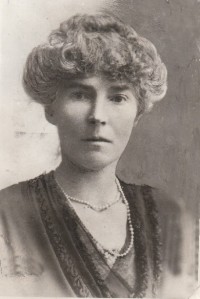As news of the Middle East dominates so much of the news media, many of us turn away tired of hearing about the quarrels  that never seem to be settled. How did we ever get so involved in places so far away from home? And why should we care about the deserts of Arabia? Gertrude Bell has a lot to answer for.
that never seem to be settled. How did we ever get so involved in places so far away from home? And why should we care about the deserts of Arabia? Gertrude Bell has a lot to answer for.
You may wonder who Gertrude Bell is, but you probably know Lawrence of Arabia from the blockbuster movie with Peter O’Toole who imprinted his image firmly in Hollywood. Well, Gertrude Bell is about to get the same treatment. Werner Herzog is filming a movie about her called Queen of the Desert that will be released in 2015. Like T.E. Lawrence, Gertrude Bell was an explorer who was fascinated by the landscapes and people of Arabia or Mesopotamia as it was called. But Gertrude Bell spoke better Arabic than Lawrence and drew far better maps, so she is more responsible than he for the shaping of Iraq and some other countries of the region.
Gertrude Bell was born into a wealthy family in County Durham, England, in 1868. Her mother died when she was very young, but her father soon remarried and her stepmother, Florence Bell, was a strong influence on the girl. She even decided, eventually, that Gertrude was too restless and intelligent to be decorously educated at home as other girls were. She was sent to school and even attended a women’s college in Oxford where she was the first woman ever to receive a first in history. She was not, however, awarded a degree for that because women might study and excel in learning, but it was feared that an actual degree was a step too far.
Gertrude’s father supported her desire to travel and her interest in archeology and supplied a generous allowance that made it possible for her to travel the world. She fell in love with the Middle East and spent much of her life there, learning languages, studying ruins, and getting to know the rulers and their wives.
 In 1911, when Winston Churchill was First Lord of the Admiralty, the British Navy replaced coal fired ships with oil powered ones. Suddenly England became dependent on oil from the Middle East and the exotic countries where it was produced. Access to the oil was controlled by the Ottoman Empire which encompassed most of Mesopotamia and the Turks were allies of the Germans.
In 1911, when Winston Churchill was First Lord of the Admiralty, the British Navy replaced coal fired ships with oil powered ones. Suddenly England became dependent on oil from the Middle East and the exotic countries where it was produced. Access to the oil was controlled by the Ottoman Empire which encompassed most of Mesopotamia and the Turks were allies of the Germans.
British intelligence was very interested in what was going on there and because Gertrude was recognized as an expert, she was summoned to Cairo to help map the area. Given the rank of Major—the first woman officer in the history of British intelligence—she caused consternation among other officers who couldn’t figure out how to treat her. But she managed and she played a vital role in establishing the governments that ruled the Middle East for decades after the war.
Iraq was the country that was closest to her heart. While she was there she oversaw the establishment of the great National Museum to house antiquities of the country. She also started the library which became the National Library of Iraq.
There have been many questions raised about the role Bell played in establishing borders for countries that no Westerner truly understood, but she foresaw many of the difficulties that would arise. Perhaps before any of us make judgments about Bell’ work we should read the biography written by Georgina Howell, Gertrude Bell: Queen of the Desert, Shaper of Nations. And of course, don’t miss the movie when it comes out next year.



